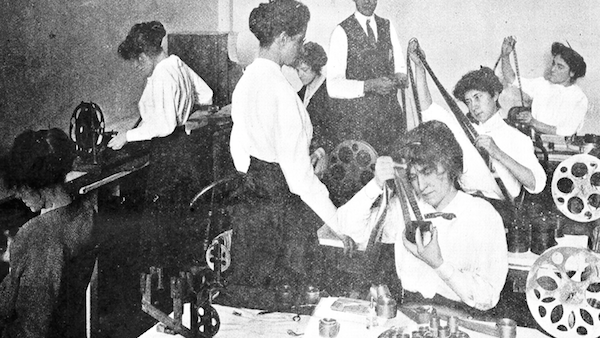Ciclo: Women at the Editing Table: Editoras que definieron el estilo clásico de Hollywood, TERCERA SESIÓN
Para celebrar el mes de la historia de la mujer, proyectaremos un ciclo de clásicos de Hollywood editados por mujeres.
¿Cuántas veces hemos oído decir que una película, realmente, se crea en la mesa de montaje? ¿Cuántas veces se elogia la edición, las transiciones y el ritmo de las escenas? Sin embargo, la figura tras esta labor no recibe la atención que reciben los directores o los productores y, mucho menos, las estrellas de cine. Como consecuencia, pocas personas saben que ha habido un gran número de mujeres que han hecho contribuciones esenciales al arte del montaje.
La presencia de mujeres en el campo de la edición existe desde que existe el cine mismo y se extiende hasta nuestros días. Mujeres de enorme talento han cortado, pegado y dado forma a muchas de las obras maestras del cine clásico de Hollywood, desde westerns hasta musicales, pasando por películas de cine negro y comedias de enredo. Este ciclo de cine busca ofrecer una pequeña muestra de esta fascinante historia.
Antes de cada proyección, habrá una breve introducción para situar cada película en su contexto concreto y ahondar en la biografía de la editora que la montó. Proyección en versión original (inglés) con subtítulos en español.
Tercera Sesión: Miércoles, 14 de marzo a las 19h.
Eva al desnudo (All About Eve, 1950, Josheph L. Mankiewicz) editada por Barbara McLean
Ciclo completo: Editoras que definieron el estilo clásico de Hollywood
Primera sesión: Jueves, 1 de marzo a las 19h.
Ser o no ser (To Be or Not To Be, 1942, Ernst Lubitsch) editada por Dorothy Spencer
Segunda sesión: Miércoles, 7 de marzo a las 19h.
La dama de Shanghai (The Lady From Shanghai, 1947, Orson Welles) editada por Viola Lawrence
Tercera sesión: Miércoles, 14 de marzo a las 19h.
Eva al desnudo (All About Eve, 1950, Josheph L. Mankiewicz) editada por Barbara McLean
Cuarta sesión: Miércoles, 21 de marzo a las 19h.
Cantando bajo la lluvia (Singin’ in the Rain, 1952 Stanley Donen y Gene Kelly) editada por Adrienne Fazan
Quinta sesión: Miércoles, 4 de abril a las 19h.
Bonnie and Clyde (Bonnie and Clyede, 1967, Arthur Penn) editada por Dede Allen
Comisaria del ciclo: Sibley Labandeira
Gestora cultural, experta en cine y doctora en Humanidades por la Universidad Carlos III de Madrid. Su tesis From Waste to Worth: Recycling Moving Images as a Means for Historical Inquiry se centra en la noción de la imagen en movimiento como una herramienta de pensamiento crítico, en concreto en casos que usan eventos históricos y sus registros audiovisuales.
Como gestora cultural ha desarrollado y producido diversos programas y eventos para instituciones como Medialab-Prado y ARCO. Coordinó el laboratorio ciudadano Retiro Experimenta, parte del programa pionero Experimenta Distrito, en colaboración con el Ayuntamiento de Madrid. Como comisaria independiente fue responsable de la exposición Matar al padre. Ha publicado artículos en revistas especializadas y ha participado en congresos organizados por instituciones como APME, CENDEAC, el Instituto de Historiografía Julio Caro Baroja y la Universidad Carlos III de Madrid.
Actualmente es miembro del Grupo de Investigación, financiado por el Ministerio de Educación, Sujetos, emociones y estructuras. Para un proyecto de teoría social crítica, del Departamento de Humanidades: Filosofía, Lengua y Teoría Literaria de la Universidad Carlos III de Madrid.
Programa:
Presentación de la película "All About Eve" (1950, Joseph L. Mankiewicz) edited by Barbara McLean
Detalles del evento
- Fecha: 14 marzo, 2018
- Hora: 7:00 pm - 9:00 pm
- Aula: 101
-
El evento ha finalizado
El registro está cerrado, ya que el evento ha finalizado.

